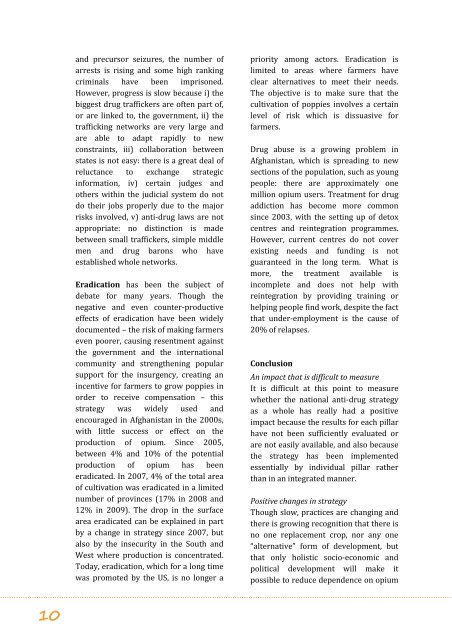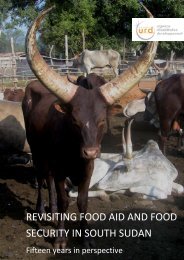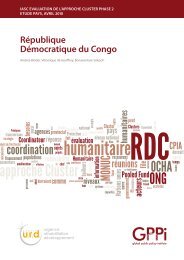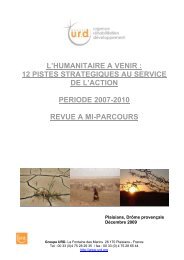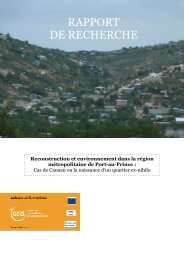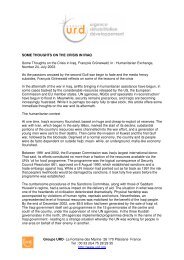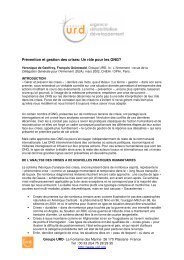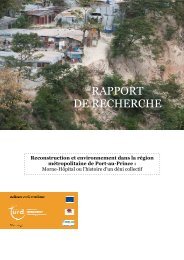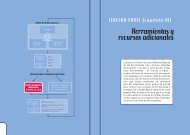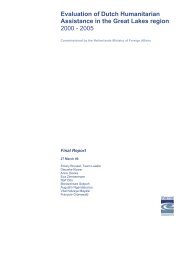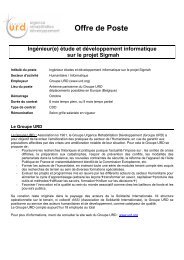strategies to counter opiate in Afghanistan - Groupe URD
strategies to counter opiate in Afghanistan - Groupe URD
strategies to counter opiate in Afghanistan - Groupe URD
Create successful ePaper yourself
Turn your PDF publications into a flip-book with our unique Google optimized e-Paper software.
and precursor seizures, the number of<br />
arrests is ris<strong>in</strong>g and some high rank<strong>in</strong>g<br />
crim<strong>in</strong>als have been imprisoned.<br />
However, progress is slow because i) the<br />
biggest drug traffickers are often part of,<br />
or are l<strong>in</strong>ked <strong>to</strong>, the government, ii) the<br />
traffick<strong>in</strong>g networks are very large and<br />
are able <strong>to</strong> adapt rapidly <strong>to</strong> new<br />
constra<strong>in</strong>ts, iii) collaboration between<br />
states is not easy: there is a great deal of<br />
reluctance <strong>to</strong> exchange strategic<br />
<strong>in</strong>formation, iv) certa<strong>in</strong> judges and<br />
others with<strong>in</strong> the judicial system do not<br />
do their jobs properly due <strong>to</strong> the major<br />
risks <strong>in</strong>volved, v) anti-drug laws are not<br />
appropriate: no dist<strong>in</strong>ction is made<br />
between small traffickers, simple middle<br />
men and drug barons who have<br />
established whole networks.<br />
Eradication has been the subject of<br />
debate for many years. Though the<br />
negative and even <strong>counter</strong>-productive<br />
effects of eradication have been widely<br />
documented – the risk of mak<strong>in</strong>g farmers<br />
even poorer, caus<strong>in</strong>g resentment aga<strong>in</strong>st<br />
the government and the <strong>in</strong>ternational<br />
community and strengthen<strong>in</strong>g popular<br />
support for the <strong>in</strong>surgency, creat<strong>in</strong>g an<br />
<strong>in</strong>centive for farmers <strong>to</strong> grow poppies <strong>in</strong><br />
order <strong>to</strong> receive compensation – this<br />
strategy was widely used and<br />
encouraged <strong>in</strong> <strong>Afghanistan</strong> <strong>in</strong> the 2000s,<br />
with little success or effect on the<br />
production of opium. S<strong>in</strong>ce 2005,<br />
between 4% and 10% of the potential<br />
production of opium has been<br />
eradicated. In 2007, 4% of the <strong>to</strong>tal area<br />
of cultivation was eradicated <strong>in</strong> a limited<br />
number of prov<strong>in</strong>ces (17% <strong>in</strong> 2008 and<br />
12% <strong>in</strong> 2009). The drop <strong>in</strong> the surface<br />
area eradicated can be expla<strong>in</strong>ed <strong>in</strong> part<br />
by a change <strong>in</strong> strategy s<strong>in</strong>ce 2007, but<br />
also by the <strong>in</strong>security <strong>in</strong> the South and<br />
West where production is concentrated.<br />
Today, eradication, which for a long time<br />
was promoted by the US, is no longer a<br />
priority among ac<strong>to</strong>rs. Eradication is<br />
limited <strong>to</strong> areas where farmers have<br />
clear alternatives <strong>to</strong> meet their needs.<br />
The objective is <strong>to</strong> make sure that the<br />
cultivation of poppies <strong>in</strong>volves a certa<strong>in</strong><br />
level of risk which is dissuasive for<br />
farmers.<br />
Drug abuse is a grow<strong>in</strong>g problem <strong>in</strong><br />
<strong>Afghanistan</strong>, which is spread<strong>in</strong>g <strong>to</strong> new<br />
sections of the population, such as young<br />
people: there are approximately one<br />
million opium users. Treatment for drug<br />
addiction has become more common<br />
s<strong>in</strong>ce 2003, with the sett<strong>in</strong>g up of de<strong>to</strong>x<br />
centres and re<strong>in</strong>tegration programmes.<br />
However, current centres do not cover<br />
exist<strong>in</strong>g needs and fund<strong>in</strong>g is not<br />
guaranteed <strong>in</strong> the long term. What is<br />
more, the treatment available is<br />
<strong>in</strong>complete and does not help with<br />
re<strong>in</strong>tegration by provid<strong>in</strong>g tra<strong>in</strong><strong>in</strong>g or<br />
help<strong>in</strong>g people f<strong>in</strong>d work, despite the fact<br />
that under-employment is the cause of<br />
20% of relapses.<br />
Conclusion<br />
An impact that is difficult <strong>to</strong> measure<br />
It is difficult at this po<strong>in</strong>t <strong>to</strong> measure<br />
whether the national anti-drug strategy<br />
as a whole has really had a positive<br />
impact because the results for each pillar<br />
have not been sufficiently evaluated or<br />
are not easily available, and also because<br />
the strategy has been implemented<br />
essentially by <strong>in</strong>dividual pillar rather<br />
than <strong>in</strong> an <strong>in</strong>tegrated manner.<br />
Positive changes <strong>in</strong> strategy<br />
Though slow, practices are chang<strong>in</strong>g and<br />
there is grow<strong>in</strong>g recognition that there is<br />
no one replacement crop, nor any one<br />
“alternative” form of development, but<br />
that only holistic socio-economic and<br />
political development will make it<br />
possible <strong>to</strong> reduce dependence on opium<br />
10


